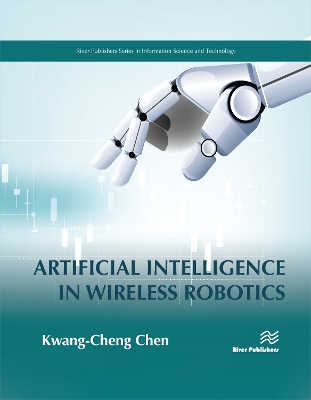River Publishers Information Science and Technology
1 total work
Robots, autonomous vehicles, unmanned aerial vehicles, and smart factory, will significantly change human living style in digital society. Artificial Intelligence in Wireless Robotics introduces how wireless communications and networking technology enhances facilitation of artificial intelligence in robotics, which bridges basic multi-disciplinary knowledge among artificial intelligence, wireless communications, computing, and control in robotics. A unique aspect of the book is to introduce applying communication and signal processing techniques to enhance traditional artificial intelligence in robotics and multi-agent systems.
The technical contents of this book include fundamental knowledge in robotics, cyber-physical systems, artificial intelligence, statistical decision and Markov decision process, reinforcement learning, state estimation, localization, computer vision and multi-modal data fusion, robot planning, multi-agent systems, networked multi-agent systems, security and robustness of networked robots, and ultra-reliable and low-latency machine-to-machine networking. Examples and exercises are provided for easy and effective comprehension.
Engineers wishing to extend knowledge in the robotics, AI, and wireless communications, would be benefited from this book. In the meantime, the book is ready as a textbook for senior undergraduate students or first-year graduate students in electrical engineering, computer engineering, computer science, and general engineering students. The readers of this book shall have basic knowledge in undergraduate probability and linear algebra, and basic programming capability, in order to enjoy deep reading.
The technical contents of this book include fundamental knowledge in robotics, cyber-physical systems, artificial intelligence, statistical decision and Markov decision process, reinforcement learning, state estimation, localization, computer vision and multi-modal data fusion, robot planning, multi-agent systems, networked multi-agent systems, security and robustness of networked robots, and ultra-reliable and low-latency machine-to-machine networking. Examples and exercises are provided for easy and effective comprehension.
Engineers wishing to extend knowledge in the robotics, AI, and wireless communications, would be benefited from this book. In the meantime, the book is ready as a textbook for senior undergraduate students or first-year graduate students in electrical engineering, computer engineering, computer science, and general engineering students. The readers of this book shall have basic knowledge in undergraduate probability and linear algebra, and basic programming capability, in order to enjoy deep reading.
